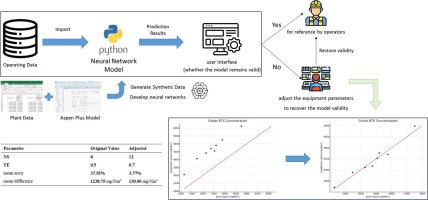A practical method for maintaining the validity of hybrid AI process models without retraining
IF 3.9
2区 工程技术
Q2 COMPUTER SCIENCE, INTERDISCIPLINARY APPLICATIONS
引用次数: 0
Abstract
A challenge with AI models is that model validity usually deteriorates over time as properties of the process gradually change. For example, catalyst activity in reactors may decrease due to poisoning or thermal degradation, the heat transfer coefficient in heat exchangers may decrease due to fouling, and the tray efficiency in distillation columns may decrease due to plugging. Usually retraining is required to restore the model prediction performance, which is costly and time-consuming.
To address this problem, a practical hybrid AI framework is proposed that incorporates equipment parameters such as tray efficiency as input variables. This allows the model accuracy to be restored by adjusting these parameters, which significantly reduces the need for the time-consuming and expensive process of retraining the model. The industrial applicability of this method is demonstrated using an industrial process for coke oven gas (COG) scrubbing and light oil recovery.
The results show that the error of using the AI model developed in 2024 to predict the data for 2021 is up to 37.55%. By adjusting the equipment parameters, the error can be reduced to 3.77%. This method can effectively solve the problem of model degradation over time and can be applied to most chemical processes.

一种无需再训练即可维持混合人工智能过程模型有效性的实用方法
人工智能模型的一个挑战是,随着过程的属性逐渐改变,模型的有效性通常会随着时间的推移而恶化。例如,反应器中的催化剂活性可能因中毒或热降解而降低,热交换器中的传热系数可能因结垢而降低,精馏塔中的塔盘效率可能因堵塞而降低。通常需要重新训练来恢复模型的预测性能,这是昂贵且耗时的。为了解决这个问题,提出了一个实用的混合人工智能框架,该框架将设备参数(如托盘效率)作为输入变量。这允许通过调整这些参数来恢复模型的准确性,这大大减少了对重新训练模型的耗时和昂贵过程的需求。以焦炉煤气洗涤和轻质油回收为例,验证了该方法的工业适用性。结果表明,使用2024年开发的人工智能模型预测2021年数据的误差高达37.55%。通过调整设备参数,误差可降至3.77%。该方法可以有效地解决模型随时间退化的问题,适用于大多数化学过程。
本文章由计算机程序翻译,如有差异,请以英文原文为准。
求助全文
约1分钟内获得全文
求助全文
来源期刊

Computers & Chemical Engineering
工程技术-工程:化工
CiteScore
8.70
自引率
14.00%
发文量
374
审稿时长
70 days
期刊介绍:
Computers & Chemical Engineering is primarily a journal of record for new developments in the application of computing and systems technology to chemical engineering problems.
 求助内容:
求助内容: 应助结果提醒方式:
应助结果提醒方式:


